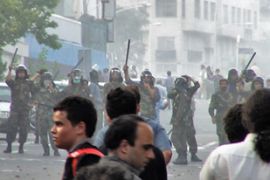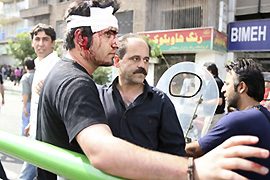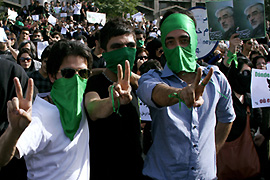Iran’s Mousavi urges more protests
Lockdown on streets of Tehran as signs of struggle emerge among ruling clerics.

| In depth |
 The latest on Iran’s post-election unrest
|
In the latest crackdowns on reporters a BBC correspondent has been expelled from the country, the Dubai-based TV network Al-Arabiya has been suspended and at least two local journalists for US magazines have been arrested.
Mahmoud Ahmadinejad, Iran’s conservative incumbent president, was declared the winner of the June 12 presidential election with a landslide victory, but Mousavi and another challenger have complained that the vote was rigged.
On Sunday, reports emerged of police attacking a vigil by about 100 people outside the offices of the United Nations in Tehran.
The incident was the first violence since Saturday, when several people were killed in clashes between protesters and police around Revolution Square and Azadi Square in the centre of the Iranian capital.
In his statement, Mousavi said he would stand by the protesters “at all times” but also called on his supporters to exercise “self-restraint”.
 |
| Five members of Rafsanjani’s family were arrested after Saturday’s protests [EPA] |
“The revolution is your legacy. To protest against lies and fraud is your right. Be hopeful that you will get your right and do not allow others who want to provoke your anger … to prevail.”
Underscoring the escalating political crisis, the government said it had arrested the daughter and four other relatives of Hashemi Rafsanjani, a former president and one of the country’s most powerful ayatollahs.
Four were later released, but Faezeh Hashemi, Rafsanjani’s eldest daughter who was accused of taking part in an illegal opposition protest, remained in detention, state-owned Press TV reported on Sunday night.
The arrests are being seen by many as a sign of a growing backstage struggle among the clerics who wield ultimate power in Iran, and a warning to Rafsanjani against aligning with the opposition.
Rafsanjani heads two very powerful groups in Iran: the Assembly of Experts, which can elect and dismiss the supreme leader, and the Expediency Council, a body that arbitrates disputes between parliament and the unelected Guardian Council.
‘Terrorist groups’
Iranian state TV reports on Sunday blamed rioters and “terrorist groups” for the previous day’s violence, saying two petrol stations and a mosque had been set alight, and a military outpost attacked.
About 3,000 opposition protesters had tried on Saturday to enter the area, undaunted by a warning from Ayatollah Ali Khamenei, Iran’s supreme leader, not to continue demonstrations against Ahmadinejad’s re-election.
 |
| Iranian authorities blamed “terrorists” and rioters for clashes [Reuters] |
Security forces responded with live rounds, batons and tear gas, while protesters fought back with stones and set fires in the streets.
Mohsen Makhmalbaf, a spokesman for Mousavi, defended the actions of the protesters.
“These people are in the streets to say ‘We don’t want atomic bombs, we want democracy’,” he told Al Jazeera from Paris.
Witnesses said that dozens of people were hospitalised after being beaten by police and the pro-government Basiji militia.
The New-York based International Campaign for Human Rights in Iran said that scores of injured demonstrators had been arrested as they sought medical treatment.
It said doctors in Tehran’s hospitals had been ordered to report injuries to the authorities, and that some seriously wounded protesters had sought refuge at foreign embassies in a bid to evade arrest.
“The arrest of citizens seeking care for wounds suffered at the hands of security forces when they attempted to exercise rights guaranteed under their own constitution and international law is deplorable,” Hadi Ghaemi, the spokesman for the campaign, said.
Reports on community-driven websites such as Twitter claimed that a number of protesters were killed by police.
One video uploaded to YouTube on Saturday purportedly showed a teenage girl – referred to as Neda on social-networking sites – dying on the street after being shot by police.
British blamed
 |
| Mousavi has called on his supporters to protest against “lies and dishonesty” [Reuters] |
As the clashes took place, local news agencies said that a suspected suicide bomber had blown himself up outside the shrine of Ayatollah Ruhollah Khomeini, the leader of the Islamic revolution in 1979, injuring at least two people.
Government-run television said members of the exiled Mujahedeen-e-Khalq (MEK)opposition group were arrested in connection with Saturday’s unrest.
The report claimed they were acting under British influence.
Al Jazeera was unable to verify the authenticity of the video or other reports of violence due to an official ban on independent reporting in the capital.
State broadcaster IRINN said 100 people were injured in Saturday’s violence.
Human rights group Amnesty International cautioned that it was “perilously hard” to verify the casualty figures with the government increasingly clamping down on the flow of information.
“The climate of fear has cast a shadow over the whole situation,” Drewery Dyke, Amnesty’s chief Iran researcher, said.
“In the 10 years I’ve been following this country, I’ve never felt more at sea than I do now. It’s just cut off.”
Scholars critical
Grand Ayatollah Hossein Ali Montazeri, who was key figure in the Islamic revolution in 1979 but is now under house arrest after falling out with the current religious leadership, criticised the crackdown and called for three days of mourning for the dead.
“Resisting people’s demand is religiously prohibited,” he said in a statement on his website.
Mohammad Khatami, a former president, also spoke out, criticising the decision to allow the Guardian Council, the country’s top legislative body, to rule on the legitimacy of the vote.
“Referring the dispute to a body which has not been impartial regarding the vote, is not a solution,” he said in a statement reported on the Mehr news agency.
The Guardian Council has offered a partial recount of ballots in order to appease protesters, but Makhmalbaf told Al Jazeera: “We want [a] revote, not [a] recount.”
“We ask all people around the world not to confirm Ahmadinejad as our president,” he said.
